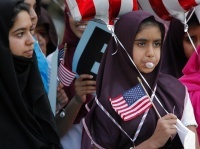c. 2008 Religion News Service
(UNDATED) When Zahir Mian’s prayer clock rings to announce the sunset prayer, he politely excuses himself and performs his ritual pre-prayer ablution, unfurls a prayer rug towards Mecca, and prays like any Muslim.
Mian, a 34-year-old IT manager, also fasts during the Muslim holy month of Ramadan, reads the Quran every night, and when asked to help resettle Bosnian Muslim refugees, he didn’t blink an eye.
“They were fellow Muslims, so there was an immediate connection there,” said Mian, whose home in suburban Boston is replete with rugs and wall hangings inscribed with Islamic calligraphy.
Not all followers of Islam, however, would consider Mian a fellow Muslim.
Mian belongs to the Ahmadiyya sect, a small but well organized religious movement founded in 1889 in India. Ahmadi officials claim an estimated 70 million followers around the world, including 15,000 in the United States, though independent counts are hard to come by.
Although their beliefs are nearly identical to those of mainstream Sunni Muslims, Ahmadis (as followers are known) also believe their founder, Mirza Ghulam Ahmad, was sent by God as a divine reformer and the “promised Messiah.”
That belief, which conflicts with the cornerstone Islamic belief that Mohammed was God’s final prophet, has made Ahmadis targets for discrimination and violence in Pakistan, Indonesia and Bangladesh.
Many Ahmadis fled to America, Britain and other Western countries, where they flourished. Indeed, earlier this month, nearly 10,000 Ahmadis descended on Harrisburg, Pa., to commemorate the 100th anniversary of the “Khilifat,” the leadership structure created after Ghulam Ahmad’s death in 1908.
While life in America is light years away from what they left, Ahmadis say they face a double whammy _ hostility from non-Muslim Americans who associate them with 9/11, and from non-Ahmadi Muslims who view them as deviants or even heretics.
Persecution is a constant throughout Ahmadi history. The Second Caliph survived an assassination attempt in 1954. Pakistan officially declared Ahmadis non-Muslims in 1974, and 10 years later made it illegal for Ahmadis to claim to be or act as Muslims. That move prohibited them from using Islamic greetings, issuing the five-times-daily call to prayer, reciting Islamic prayers, or fasting during Ramadan.
“Many people paid a price for expressing their faith,” said Mian, who lived in the sect’s spiritual home, Rabwah, until the group’s Khalifah, or spiritual leader, fled to London in 1984. Mian remembers Pakistani soldiers painting over Islamic verses inside Ahmadi mosques, and a rash of beatings and murders.
Persecution, however, has helped forge a tight-knit community that makes up in organizational savvy what it lacks in numbers.
Ahmadis have an extensive network of mosques across the United States, their own humanitarian organization and a 24-hour television station that offers news, sermons and other Ahmadi-themed programming. The community also issues membership cards to followers and has established mentoring groups to help young Ahmadis succeed academically.
“We feel like there’s a special bond that makes us successful,” said Mian. “The persecution gives us extra motivation.”
Mian describes relations with more mainstream Muslim groups as “strained.” For example, he said his group has had more success reaching out to Boston-area Christian and Jewish groups than local Muslims.
“It’s not a very cooperative relationship,” he said. “We’ve tried to engage the community, but it hasn’t panned out.”
Nationally, organizational contact is also limited, but Ahmadi officials say they are optimistic, and say relations are better between individual Ahmadis and individual Muslims.
“Most if not all Muslims are good-hearted and open-minded in the way that Islam tells them to be open-hearted,” said Harris Zafar, director of the U.S. chapter of the Ahmadiyya Muslim Community Intellectual Outreach Committee.
Mainstream Muslim hostility toward Ahmadis is “a legitimate perception” said Salam Al Marayati, executive director of the Muslim Public Affairs Council in Los Angeles, though he believes relations are improving. The lack of contact is “not by design,” he said.
In fact, there are signs that mainstream Muslims are reaching out to Ahmadis in small ways. When a Pennsylvania state legislator said he would vote against a resolution recognizing the Ahmadiyya’s recent convention because “Muslims do not recognize Jesus Christ as God,” the Washington-based Council on American-Islamic Relations denounced him and urged other lawmakers to do the same.
(BEGIN OPTIONAL TRIM)
Ahmed Rehab, a CAIR spokesman, said as a Muslim civil rights group “defending those who are targeted for being Muslim, or educating them on their rights, we do not quiz constituents on their sectarian affiliations.”
Ihsan Bagby, an Islamic studies professor at the University of Kentucky who will direct an upcoming census of American Muslims, said Ahmadis would be included in the survey conducted by a coalition of U.S. Muslim groups.
(END OPTIONAL TRIM)
Still, like other immigrant groups, the movement faces new challenges. Some American-born Ahmadis who have not lived the persecution of their parents or immigrant peers don’t share the same communal bond that was forged by suffering. At the same time, living in a pluralistic society has encouraged explorations of other faiths.
Zafar acknowledged that many Ahmadis wrestle with their beliefs, and that some even leave the community, but said every religion has to deal with that.
“Every community has members who decide not to stick with it,” Zafar said. “That’s perfectly natural.”
KRE DS END SACIRBEY950 words, with optional trim to 875
A photo of Mirza Masroor Ahmad, the worldwide leader of Ahmadi Muslims, and the Harrisburg convention, are available via https://religionnews.com.





